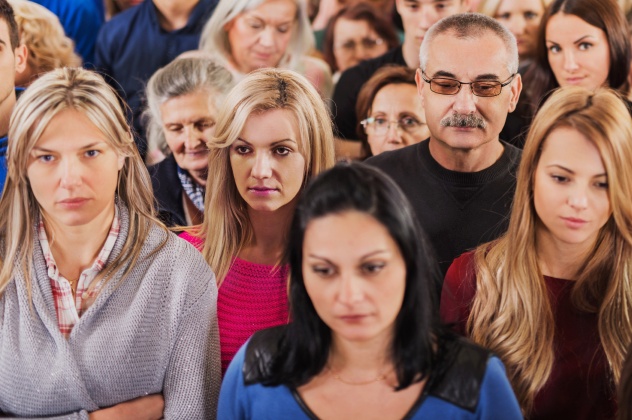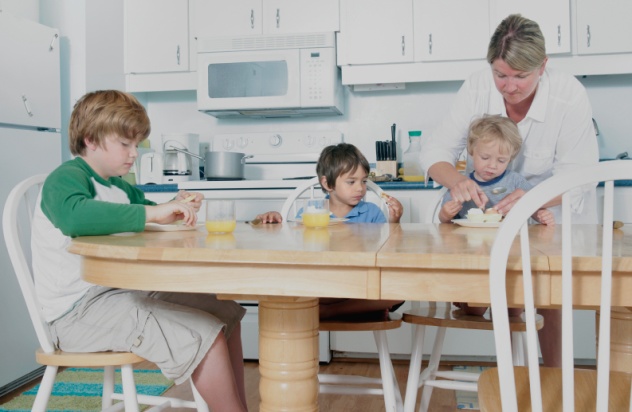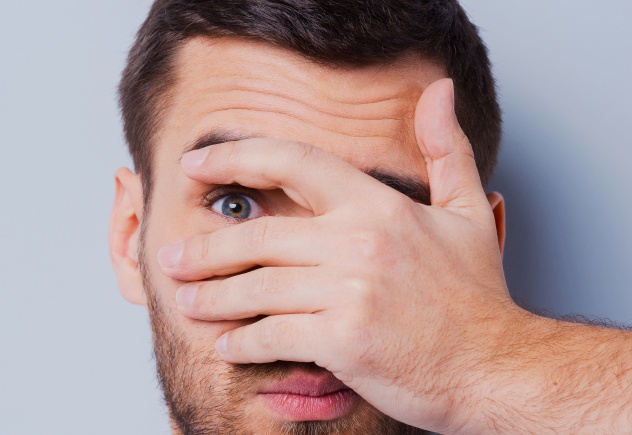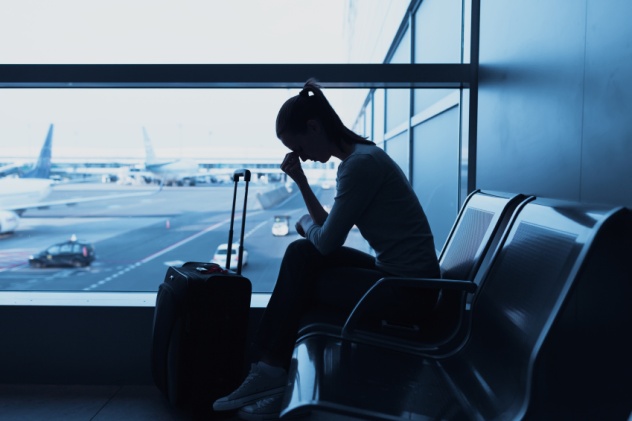 Movies and TV
Movies and TV  Movies and TV
Movies and TV  History
History 10 Things You Never Knew About Presidential First Ladies
 Movies and TV
Movies and TV 10 Zombie Movies That Will Actually Terrify You
 Humans
Humans 10 Times Scientists Were Absolutely Sure… and Absolutely Wrong
 Our World
Our World 10 Pivotal Moments for Life on Earth
 Movies and TV
Movies and TV 10 Most Realistic Medical TV Shows of All Time
 Creepy
Creepy 10 Eerie & Mysterious Ghosts of the Pacific Coast
 Weird Stuff
Weird Stuff 10 Typos That Accidentally Changed History
 History
History 10 Times Trickery Won Battles
 Technology
Technology 10 Awesome Upgrades to Common Household Items
 Movies and TV
Movies and TV 10 Movie Flops That Found Their Way to Cult Classic Status
 History
History 10 Things You Never Knew About Presidential First Ladies
 Movies and TV
Movies and TV 10 Zombie Movies That Will Actually Terrify You
Who's Behind Listverse?

Jamie Frater
Head Editor
Jamie founded Listverse due to an insatiable desire to share fascinating, obscure, and bizarre facts. He has been a guest speaker on numerous national radio and television stations and is a five time published author.
More About Us Humans
Humans 10 Times Scientists Were Absolutely Sure… and Absolutely Wrong
 Our World
Our World 10 Pivotal Moments for Life on Earth
 Movies and TV
Movies and TV 10 Most Realistic Medical TV Shows of All Time
 Creepy
Creepy 10 Eerie & Mysterious Ghosts of the Pacific Coast
 Weird Stuff
Weird Stuff 10 Typos That Accidentally Changed History
 History
History 10 Times Trickery Won Battles
 Technology
Technology 10 Awesome Upgrades to Common Household Items
10 Soul-Crushing Things You Should Know About Happiness
Much of what we do every day has the ultimate goal of making us happy. It’s why we eat the foods we like, why we choose a video game over work, and why we stay out far too late even though we have to get up in the morning. Our lives are spent chasing happiness, and for many, it seems like we can only get a few tantalizing tastes of it. Ultimately, boredom, sadness, and stress will creep back in, and we’ll feel like we’re back to square one. There’s a reason for that, and there are some seriously soul-crushing truths behind our collective quest for happiness.
10 You May Be Genetically Incapable Of Happiness

Our genes are responsible for many things, and it’s quite likely that one of those things is determining how happy we generally are. Researchers from the University of Minnesota found a definite link between the levels of happiness reported by twins who had been separated at birth, regardless of the lives they had built for themselves. While environment certainly has a huge impact on happiness, it’s likely that biology plays just as big a part.
Some groundbreaking research on the biology of happiness also came from the rather unlikely source of the London School of Economics and Political Science. Researchers isolated a specific gene that seemed to be linked to a person’s likelihood of being either happy or miserable with their life. After asking over 2,500 Americans how they felt about their lives, they found that those who had inherited two long versions of the gene were much more likely to be happy. Of the 40 percent of volunteers who said that they were happy with their lives, more than 35 percent had two long versions of the gene 5-HTT.
The gene, which has been linked to the body’s production of serotonin, seems to also impact a person’s ability to focus on the good things in life. A study from the University of Essex suggested that people who inherit two long versions of 5-HTT are better equipped to deal with stress, keep a positive outlook on life, and fight depression.
The London study also said that inheriting two short versions of the gene appears to make people much more susceptible to feeling the negative side of life. Only about 19 percent of these people claimed that they were very satisfied with their lives.
9 Happiness Is On the Decline

Take a look at how far society’s come in the last few decades, and it would seem like we should be happier now than ever before. We have a lot of things that no one had in 1972, after all, like smartphones, Netflix, Amazon, and eBay. However, a closer look at just how happy people really are suggests that happiness is proving more and more elusive, especially for adults.
A study published in Social Psychological and Personality Science examined 1.3 million Americans between 13 and 96 years old. Generally, it’s been accepted that as you age, you tend to figure out a little bit more about how this whole life thing works, and you become happier and better equipped to deal with the occasional curveball. Starting around 2010, however, that age and happiness correlation all but disappeared as happiness positions are reversed.
They found that teenagers and young adults were much happier, but as they approached their thirties, happiness plummeted. One theory about why that’s happening is that teens have rather unrealistic expectations about their life. In the 1970s, it was expected that you would get out of school, work ridiculously hard, and pay your dues to society and your employer before you reaped the benefits. The study found that 64 percent of high school students in 2015 expected to be a manager or well-entrenched in a successful professional career by the time they were 30. When life doesn’t live up to expectations (only about 18 percent of people actually attain that goal), happiness drops off severely. Factor in some other things, like a shift in focus toward building up the individual rather than putting work into relationships as well as massive income inequality, and real life just doesn’t stack up.
8 The Third Kid Is The Worst

According to some parents, having kids is the meaning of life. According to others, it’s just not for them, and they can’t even begin to imagine having kids themselves. So what’s the science behind how happy kids make us?
A few researchers from the Max Planck Institute for Demographic Research took a look at just how having kids impacted the parents’ happiness. They found that while there were some instances where kids did increase the reported happiness of parents, there were also times when they seemed to make life infinitely worse.
Do you have two older siblings? If so, then congratulations, your birth was probably one of the low points of your parents’ lives. In a survey of British, American, and German parents, it was found that the happiness that came with the birth of a first child typically reached a high point just before the birth and in the immediate time around it before settling back to pre-child levels. The same thing happened with the second child, although the spike was less pronounced. Third children had absolutely no positive effects associated with their arrival, and there were even trends that suggested a downward spiral in happiness in the time after the birth.
They also found that, in terms of happiness, there’s an optimal time to have children. Those between ages 35 and 49 were the happiest with the arrival of a child, while those who had children young were emotionally dragged down by it. Not surprisingly, the worst-off were those who had children when they were between 18 and 22 years old, reporting that the time leading up to the child’s birth was about as opposite of “happy” as you can imagine, and things only got worse from there. Those between 23 and 34 generally maintained their baseline level of happiness . . . as long as they didn’t have that third child.
7 Schadenfreude Comes Hard-Wired

We’ve all felt that little spike of malicious delight when something horrible happens to someone we hate. Whether it’s the coworker we can’t stand or a traitorous old friend getting their comeuppance, we love seeing terrible things happen to others. It’s a horrible kind of happiness, perhaps, but it’s one that we’re born knowing how to experience—and enjoy.
Schadenfreude is a pretty complicated emotion when you look at it. It’s a deep-seated dislike of someone coupled with an acknowledgment of just how horrible that person is feeling at that moment. It’s long been debated just how complicated the emotional abilities of very young children are, and it turns out that even though they seem incapable of understanding that the piercing scream they’re uttering just for the heck of it is giving you a headache, they can absolutely appreciate a little bit of schadenfreude.
Researchers from the University of Haifa set up a test that involved a mother, her own child, and another child we’ll call the interloper. When the mother read a book aloud to herself and treated both children equally, things were fine, even when she spilled water on the book. In another part, the mother was told to put the interloper on her lap and read aloud, before “accidentally” spilling water on the book. When that happened, her own child, without fail, expressed signs of delight that we wish were acceptable in adulthood. Children jumped up and down, clapped their hands, and giggled when the unfair, unequal situation came to a screeching halt.
Children as young as two years old demonstrated that they’re more than capable of feeling this kind of happiness—the kind that relies on crushing the hopes, dreams, and story times of others.
6 The Difference Between Pleasure And Happiness

Despite all the time we spend searching for happiness, it’s possible we’re doing it so wrong that we’re not even chasing the right thing. Take a look at what you’ve done recently to increase your happiness. Have you gone out to eat a favorite meal? What about splurging on a nice bottle of wine? Have you planned a trip, bought a new car, renovated a home, or gone out to see a good movie? If so, you’re chasing happiness wrong.
What all those things will give you is a sense of pleasure, which isn’t the same thing as happiness. Pleasure is considered a momentary sense of well-being, and it won’t last because it’s dependent on the state of things around us, which we know all too well that we can’t control. According to some psychologists, pleasure can be a dangerous thing, acting on the brain just like an addiction. Pretty soon, it’s not just one bottle of wine or one dessert; a case of wine and a whole bunch of desserts are needed to make you feel the same amount of pleasure.
So what is it that you should be looking for on your quest to find happiness? It sounds a bit cliche, but the professionals say that it really isn’t what you choose to surround yourself with, but instead, it’s who you are. It’s giving rather than receiving, being a good person, helping others . . . all the stuff that absolutely doesn’t involve buying yourself a bunch of presents. Being a good person is sort of like building a foundation for dealing with all the ups and downs—particularly the downs—that life throws at you, and it’s being prepared for the horrible stuff that will inevitably come. According to psychotherapist Philip Chard, true happiness can even exist when there’s no pleasure.
5 Valuing Time Makes You Miserable

Have you ever heard the phrase, “Time is money?” It’s exactly why you’re finding yourself with less and less free time and why it’s getting harder and harder to enjoy it.
In the 1930s and 1940s, people saw a ton of new time-saving devices entering the market. There were so many that a lot of people were convinced that lives in the future would be so much easier with all the free time that people have thanks to things like dishwashers and faster cars. But something weird happened.
Work began to gain a higher and higher value, and in many commercialized and industrialized areas, the pace of life got faster and faster. That all means that suddenly, the most important (not to mention profitable) part of our day was the part that made money—not the free time that made us happy. The more we get paid per hour, the more we work, because we think that’s the best way to spend our time. One thing we can’t earn more of is time, and that makes it easy enough to put a price on what it’s worth to us.
Rather than working only three hours a day as as predicted in the 1930s, we’ve become what 1970s Swedish economist Staffan Linder dubbed the “harried leisure class.” We can’t compromise on the time we spend working, so when it comes time to enjoy things and do things that make us happy, we rush through it and don’t really enjoy it at all. Our emphasis on time is mind-boggling. A Google study found that Internet loading times only need to differ by 250 milliseconds to make the difference between us either staying on a page or leaving in search of something else.
The Rotman School of Management at the University of Toronto found that we’re so dialed into the idea that time equals money that we’re too impatient to enjoy things that should make us happy. Studies have found that asking people to think about their hourly wages then asking them to do something fun like listening to music or surfing the Internet resulted in impatient people who couldn’t wait to move on to something productive.
Even fast food has a negative impact on our ability to relax and enjoy life. The University of Toronto found that exposure to fast food (both the presence of the restaurants and the food itself) lessened subjects’ ability to savor food, enjoy pictures of nature scenes, and listen to music—all things that typically bring a feeling of happiness.
4 Suicide And Happiness

Logic dictates that a complete lack of happiness would (at least in part) contribute to high suicide rates. A recent paper by the Centre for Economic Policy Research shows that the worldwide connection between happiness and suicide isn’t all that clear. The study plotted suicide rates against life evaluation scores and found some weird things that don’t seem to make sense.
For one, Finland scores extremely high on the life evaluation scale and seems to have many people who are happy with their lives, but it’s also high on the list when it comes to suicides in Western Europe. The same is true from the so-called “suicide belt” in the United States. In a swath of the country that runs from Arizona all the way up into Alaska, people report a high life satisfaction score, but the area got its name for a reason.
When all the data was collected and plotted, it was found that areas with the highest average income and the highest overall life satisfaction ratings also had some of the highest suicide rates. That’s true for both the US and Europe. There are other odd numbers within that generalization. Most of the men surveyed reported that they had become generally happier as they aged, but as happiness numbers rose, so did the suicide rate. Divorce has been found to have a strong correlation with an increased risk for suicide, but it doesn’t have too much of an overall impact on life satisfaction.
The study’s conclusions were that happiness and overall life satisfaction had little to nothing to do with suicide, stating that there were often other factors, such as chronic pain, that seemed to have more of an impact on suicide rates.
3 Happiness Is A Major Fear

Although most of us would say that one of our goals in life is to be happy, that’s not necessarily true. According to research by New Zealand’s Victoria University of Wellington, it’s not happiness that we want; it’s unhappiness.
Psychologists created what they called the “Fear of Happiness Scale,” which they designed to reflect a person’s belief that happiness brings with it a whole host of other things, none of which are good. This belief isn’t a cultural thing, either, as they found that the scale was applicable across at least 14 different cultures, and the quiz they used to determine whether or not someone has an almost clinical fear of happiness was pretty much universal.
Fear of happiness is a surprisingly complicated thing. For some people, the idea that being happy foreshadows something bad looming on the horizon is so powerful that it can spiral into mental illness, particularly in the form of anxiety. It doesn’t take much, either. Just one happy experience ruined by some devastating news can make a person think that happiness is something of a curse. It’s one of the reasons why people who are depressed might have trouble going to places and doing things that might be fun. They continue to harbor a belief that any happy time or place will just be a huge disappointment in the end.
For some people, a certain amount of stigma is attached to being happy, too. Happiness might imply that someone’s oblivious to the problems of the world, that they’re lazy, or that they’re fine with the existing status quo. Fear of happiness even predominates in some cultures. In societies that tend to value the good of the many over the needs of the few, they’re especially afraid of happiness. India, Japan, and Hong Kong, for example, all scored high on the cultural fear of happiness scale. Religion plays a part, too, with Islamic cultures placing a higher value on sadness and hardship than on happiness, believing that it’ll get them closer to God.
2 The Scientific Benefits Of Low Expectations

Ask a pessimist why they’re a pessimist, and they might say something along the lines of not being able to be disappointed if they never expect anything good to happen. Researchers from University College London have now found that’s it’s not just a saying; it’s a mathematical formula.
The formula itself is incredibly complicated, but it essentially measures just how much happiness you’ll get out of a given activity based on your expectations going into it. It takes into account the potential rewards, expectations, risks, and outcomes. It was first used in experiments with 26 people then expanded to an app called The Great Brain Experiment, which allowed the study to collect data from around 18,000 people. The original 26 volunteers were also monitored by an fMRI machine in order to see what was going on in different areas of their brains as they were tested to see just what it was that would make them the happiest.
They found that across the board, it wasn’t what people actually had that made them happy (or unhappy). Rather, it was what they had in relation to others. The game that was designed revealed one pretty universal truth about those who played it: Happiness increased more when one’s score compared favorably to recent wins or losses than if a player simply got a huge score. Low expectations leading to happiness really is a mathematical formula, and it’s surprisingly common across all sorts of different people.
1 Vacations Don’t Necessarily Help

Dream vacations are usually high on most people’s list of things that will make them feel happy, but according to research published in Applied Research in Quality of Life, it’s not going to have the impact that people think it will.
The study followed 1,530 people over the course of 32 weeks. During the study, 974 of them went on vacation. All reported their levels of happiness throughout the study, and it was found that not only did vacations not impact their happiness levels, but they didn’t have any long-lasting effect whatsoever.
The biggest impact in happiness was seen in those who reported that their vacation was “very relaxing.” (Even those who rated their vacations as only “relaxing” weren’t much happier than they had been before the trip.) Most of the happiness that came was actually in the time leading up to the trip. Fueled by anticipation and the excitement of getting some time away from home and work, many people reported higher levels of happiness for around two months before their vacation.
That anticipatory happiness is about all vacations are good for in the happiness department. An overwhelming majority of people reported that not only did things get back to normal pretty quickly after they got back, but the vacation led to absolutely no aftereffects. Even those who were “very relaxed” only reported elevated happiness levels for a maximum of about two weeks after the trip, and many didn’t even feel that, instead feeling overwhelmed with the amount of work they needed to catch up on when they got back.
The study’s authors suggested that this means we’re doing something very wrong with the way we traditionally spend our vacation time. In order to get the most out of our days off, they say, it’s better to plan a few short vacations throughout the year, to make sure we always have something to look forward to, and to make sure that we’re not overwhelmed when we get back. Saving up for that two-week holiday of fun in the sun might seem like a good idea, but real life will be ready and waiting when you return.








